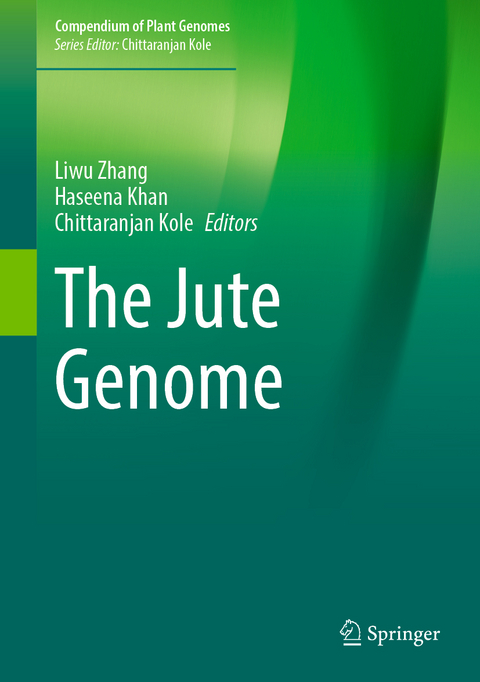
The Jute Genome
Springer International Publishing (Verlag)
978-3-030-91162-1 (ISBN)
This book is the first comprehensive compilation of deliberations on jute botanical descriptions, germplasm resources, genetic diversity and population structure, DUS test and DNA fingerprinting, interspecific hybridization, classical genetics, cytology and cytogenetics, genetic transformation; and detailed enumeration on molecular mapping, genome sequencing initiatives of three major jute fiber producing countries, interspecific and intergeneric comparative genomics, organellar genomes, elucidation on functional genomics and genomics resources and database. Genetics and genomics of bast fiber development, biotic stress resistance, abiotic stress tolerance, and flowering pathways have also been discussed. It also presents a narrative on the power of molecular markers and genomics technology on jute breeding. Altogether, the book contains about 400 pages over 21 chapters authored by internationally reputed experts on the relevant field in this crop. This book will be useful to the students, teachers and scientists in the academia and relevant private companies interested in agronomy, genetics, pathology, entomology, physiology, molecular genetics and breeding, genetic engineering, and structural and functional genomics.
lt;p>Dr. Liwu Zhang is a full professor at Fujian Agriculture and Forestry University (FAFU), Fuzhou, China, and a Director at Research Lab for Bast Fiber Crops, FAFU. He received his Ph.D. in 2010 from College of Plant Science and Technology of Huazhong Agricultural University (HZAU). From 2010 to 2012, he has been working as a post-doc in the National Key Laboratory of Crop Genetic Improvement of HZAU. From 2014 to 2015, he was at the Department of Plant Biology, Illinois University of Champaign and Urbana, IL, USA, as a visiting scholar. He has been working in genetics and crop science for more than 20 years. His current research involves in genetics and genomics for bast fiber crop improvement, especially for jute. Currently, he serves as an editor of The Crop Journal (in Chinese), a topic editor of Frontiers in Genetics, and the vice-director of Bast Fiber Academic Association, the Crop Science Society of China.
Prof. Haseena Khan is a UGC professor at the Department of Biochemistry and Molecular Biology, University of Dhaka, Bangladesh, and Secretary, The Bangladesh Academy of Sciences. She obtained her Ph.D. on Plant Molecular Biology from the University of Sussex under a Commonwealth Scholarship in 1985. She has worked as post-docs at an INRA/CNRS Institute in Toulouse, France, and at IRCM, Montreal, Canada. She has spent a year at the South Asian University, New Delhi, India, as a Visiting Professor. She has been working on jute molecular biology for over 20 years and had been involved with the jute genome initiative from Bangladesh. At present, her interest lies on applications of jute fiber which her lab has genetically modified to produce less lignin, understanding biotic stress tolerance in jute and elucidating the vast myriad of endophytic microorganisms in this fiber crop which have plant growth promotion and biocontrol properties.
Prof. Chittaranjan Kole is an internationally reputed scientist with an illustrious professional career spanning over thirty-seven years and original contributions in the fields of plant genomics and biotechnology leading to the publication of more than 150 research articles in globally leading journals. He has edited over 150 books for the leading publishers of the world including Springer Nature, Wiley-Blackwell and Taylor & Francis Group. His works and editing acumen have been appreciated by seven Nobel Laureates including Profs. Norman Borlaug, Arthur Kornberg, Werner Arber, Phillip Sharp, Günter Blobel, Lee Hartwell and Roger Kornberg. Previously he was a Visiting Professor in The Pennsylvania State University and Clemson University. He also served as the Vice-Chancellor of the BC Agricultural University in India. He is also the President and Founding Principal Coordinator of the International Climate-Resilient Crop Genomics Consortium (ICRCGC) and International Phytomedomics and Nutriomics Consortium (IPNC).Chapter 1. Economic Importance of Jute.- Chapter 2. Botany of Jute (Corchorus spp.).- Chapter 3. Chemistry of Jute and Its Applications.- Chapter 4. Germplasm Resources in Jute.- Chapter 5. DUS Test and DNA Fingerprinting Construction of Jute Varieties.- Chapter 6. Jute Interspecific Hybrids: Development, Characterization and Utilization.- Chapter 7. Classical Genetics, Cytogenetics and Traditional Breeding in Jute.- Chapter 8. Challenges of Jute Transformation.- Chapter 9. Molecular Linkage Mapping: Map Construction and Mapping of Genes/Qtls.- Chapter 10. Jute Genome Sequencing: An Indian Initiative.- Chapter 11. Jute Genome Sequencing: A Bangladeshi Initiative.- Chapter 12. Jute Genome Sequencing: A Chinese Initiative.- Chapter 13. Comparative Genomics and Synteny within Cochorus Species and Among Malvaceaes Genomes.- Chapter 14. Organelle Genome Sequencing and Phylogenetic Relationship of Jute.- Chapter 15. Functional Genomics of Jute.- Chapter 16. Jute Genomic Resources and Data Base.- Chapter 17. Genetics and Genomics of Bast Fiber Development.- Chapter 18. Genetics and Genomics of Biotic Stress Resistance of Jute.- Chapter 19. Genomics and Genetics of Drought and Salt Tolerance in Jute.- Chapter 20. Flowering Pathway of Jute Based on Genomic Data.- Chapter 21. Power of Molecular Markers and Genomics Technology on Jute Breeding.
| Erscheinungsdatum | 04.03.2022 |
|---|---|
| Reihe/Serie | Compendium of Plant Genomes |
| Zusatzinfo | XXXII, 342 p. 88 illus., 61 illus. in color. |
| Verlagsort | Cham |
| Sprache | englisch |
| Maße | 178 x 254 mm |
| Gewicht | 842 g |
| Themenwelt | Naturwissenschaften ► Biologie ► Botanik |
| Schlagworte | functional genomics • genetic transformation • Genome sequencing • Genus Corchorus • Jute • Molecular mapping • Organellar Genomes |
| ISBN-10 | 3-030-91162-4 / 3030911624 |
| ISBN-13 | 978-3-030-91162-1 / 9783030911621 |
| Zustand | Neuware |
| Informationen gemäß Produktsicherheitsverordnung (GPSR) | |
| Haben Sie eine Frage zum Produkt? |
aus dem Bereich


